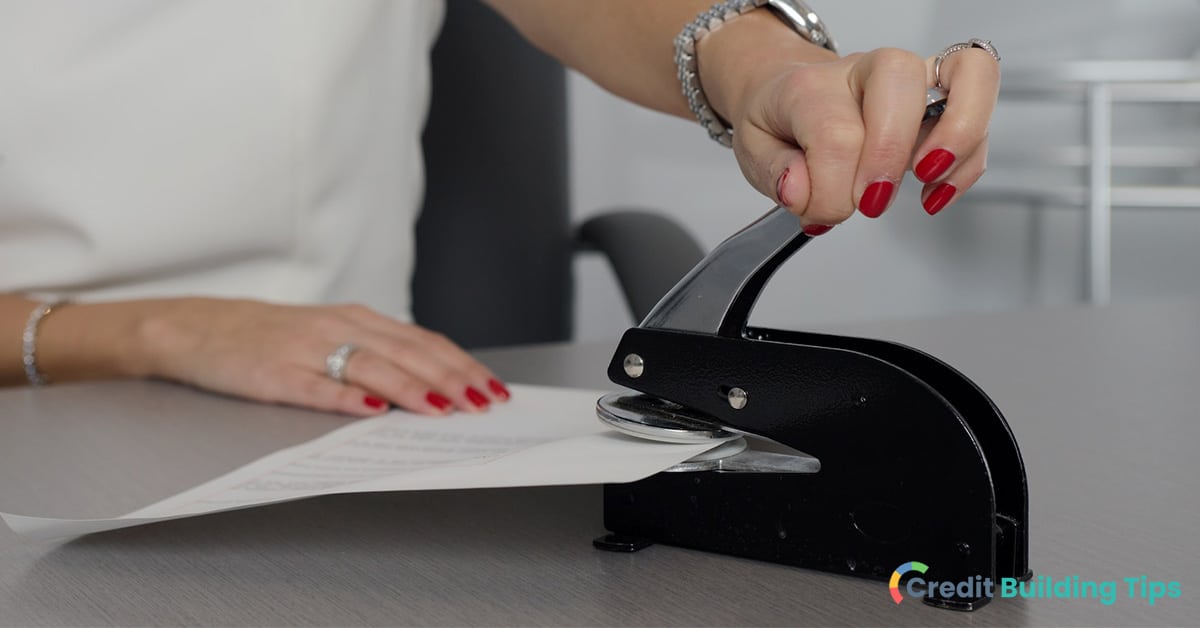If you've been evicted in the past or you are currently dealing with an eviction, learning how to get an eviction removed from your credit report is likely on your mind.
You'll be glad to know that the actual eviction itself won't show up on your credit report. In the past, the public record of a judgment against you in a civil suit (like an eviction) would show up on your credit report, but this is no longer the case. If your landlord sends an outstanding debt you owe to collections, though, this will show up on your report and impact your credit.
 Even though the actual eviction itself won't show up on your credit report, it will show up on your tenant screening report and background checks.
Even though the actual eviction itself won't show up on your credit report, it will show up on your tenant screening report and background checks.Let's look at what you need to know to clean up your records.
A common misconception is that getting evicted will show up on your credit report. The actual eviction itself will not appear on your credit report or impact your credit score.

In the past, the following related actions could be reported to the credit agencies:
That's right-- the actual act of eviction will not show up on your credit report. Until recently, legal judgments against you would appear on your credit report as well as any debts you have in collections. Nowadays, you don't have to worry about judgments showing up on your credit report, but any unpaid rent that goes to collections will appear on your report.
If you were evicted for non-payment and you still have an outstanding debt with your landlord, they might choose to sell your debt to a collection agency.
If your debt goes to collections, it will appear on your credit report. This negative mark on your credit report can decrease your credit scores and stay on your credit report for seven years.
Having a less than ideal credit score can have a major impact on your ability to rent an apartment, borrow money, and your ability to grow wealth over time. Make sure you check out these five ways you can raise your credit score instantly.
Though the eviction itself won't be recorded on your credit report, that doesn't mean it can't have negative consequences for you. This is because your eviction will show up on tenant screening reports and background checks, which are not the same as credit reports.
Your credit report is a statement containing information regarding your current credit situation and credit activity.

On your credit report, the following types of information can be found:
Though there is a ton of information about you in your credit report, some personal and financial details won't show up. These include your income, education, marital status, and bank account details.
A tenant screening report can be used by landlords to make decisions about potential tenants. Multiple sources are used to create these reports, including credit reports, rental history, and more.
Any of the following information can be found in a tenant screening report:
While the actual eviction won't show up on your credit report, it will show up on your tenant screening report.
If your landlord took you to court and won a civil suit against you, it would be recorded in the public record and, in the past, would show up on your credit report.
Historically, the following events can lead to a "public record" showing up on your credit report:
As of July 2017, though, the new reporting standards for public records actually resulted in the removal of nearly half of tax liens and all civil judgments from consumer credit reports.
In many cases, public records with negative information will stay on your credit report for somewhere between seven and ten years. These days, the only public record that will show up on your credit report is filing for bankruptcy.
Did you file for bankruptcy in the past and you're wondering whether your credit will improve after it falls off? This guide tells you everything you need to know.
If you've noticed an error regarding public records on your credit report, you can dispute these errors through the appropriate credit bureau. If an old judgment is still on your credit report, contact the credit bureau to dispute it.
If you're working to improve your credit, you might me interested to learn about some of the credit repair software programs that can help to streamline the credit repair process.
If your unpaid rent was sent to a collections agency and it's damaging your credit, there are a few things you can do.
You'll want to take a look at both your credit reports and your own records to figure out how an outstanding debt is impacting your credit.
Gather all of the information you have about payments you've made to your landlord or to the debt collector. You'll want to request your credit report from all of the major agencies-- Experian, Equifax, and TransUnion-- to see if the debt appears on all three.
You can use AnnualCreditReport.com to request your credit reports from all three of these credit bureaus.
If you believe that a collections account is on your report in error, you'll want to dispute it. You can file a dispute through the mail, on the phone, or online with the credit agencies.
Before you hire a credit repair agency to help improve your credit, read the pros and cons of credit repair services.
If the debt is correct but has been paid in full, you can ask the creditor for a goodwill deletion. While they have no obligation to do this, it doesn't hurt to ask. If you have a good track record of making payments on time, this can help your case.
It is also possible to try and broker a deal with the debt collector, stating that you will pay off the debt in exchange for the mark being removed from your credit report. If they agree to this, make sure you get them to send you the arrangement in writing.
If you are trying to improve your credit through every possible avenue, use this guide to goodwill letters to help you understand what your chances of success are.
If the collections agency has agreed to the goodwill deletion, make sure you follow up after the fact. You'll want to wait about thirty days and then pull your credit reports again to make sure that the account has been removed.
For more information about cleaning up your credit report, check out our recent post about four simple ways to remove derogatory marks on your credit.
Are you shooting for the moon when it comes to repairing your credit? Learn about the maximum possible credit score here.
If you believe that your eviction is going to show up on your tenant screening records, you're likely wondering if there's anything you can do to remove it from your record.
Let's take a look at the different steps you can take depending on your circumstance.
The first thing you'll want to do is determine whether your eviction is showing up on your tenant screening record.
If your property manager or landlord actually started the legal process of eviction against you, it will create a public record. Since judgments against you are no longer supposed to show up on your credit report, you will want to look for this information on your tenant screening report.
You can access a tenant screening report for yourself by requesting one from a tenant screening agency. If you are currently looking for an apartment, you can ask the property manager at rental you're interested in what agency they use.
Are you wondering how your credit score is going to impact your ability to rent a new place? This article looks at the credit score you'll need to rent a house or an apartment.
There are different laws surrounding eviction in every state. If you think that you were wrongfully evicted, you'll want to check in with the landlord tenant laws of your state and, in some cases, your municipality.
If you can prove that you didn't violate the lease and shouldn't have been evicted or that the property manager didn't follow the proper procedures outlined in the law, you might be able to have the eviction removed from your public record by petitioning the court.
You will want to pay any outstanding balances you have that are related to your eviction-- if they are legitimate, of course. If you don't have the funds to pay the debt in full, the collection agency or property manager might be willing to negotiate with you.
It's possible that they will agree to setting up a payment plan or settling the debt for less than the original amount.
If your unpaid rent has been sent to collections, it will stay on your credit report even after you've paid it in full or negotiated a settlement.
Before you make your payment, you can ask your property manager or the collection agency to request that the account be removed from your credit report if you pay in full. It's important to get this agreement in writing rather than relying on a verbal agreement.
If your property manager still owes the debt or is able to reclaim it, you can ask them to remove the eviction from your tenant screening report in return for a settlement or paying the debt in full. You will also want to make sure you receive this agreement in writing.
If your property manager or the collections agency agrees to remove derogatory marks from your credit report or tenant screening report, you'll want to follow up after the fact and make sure they actually do so.
If you found any inaccuracies or errors on your tenant screening record, you can contact the company you used to generate the report to dispute them. You'll want to have proof on hand that substantiates your claim that the report is not accurate, such as the documents exchanged between you and the debt collector when you agreed on a settlement or paid your rental debt.
There are few things as stressful as dealing with an eviction, and this is only magnified when it impacts your ability to borrow money, rent an apartment, or otherwise try and move forward with your life.
The good news is that evictions and civil judgments against you will not show up on your credit report.
The bad news is that any outstanding debts that have been sent to collections will show up on your credit report. Beyond this, your eviction and any judgments against you will show up on your tenant screening report.
If an eviction or a debt is showing up on either your credit report or your tenant screening report and you believe it is an error, you can dispute the error and have your reports adjusted. That is, so long as you can prove that the information was inaccurate.
While there are no guarantees, it's possible that you will be able to have the eviction removed from your tenant screening report and your debt removed from your credit report in exchange for payment. If you strike an agreement with an agency in this way, you'll want to make sure you get it in writing.
If you're motivated to improve your credit, make sure you check out the rest of our credit building blog.